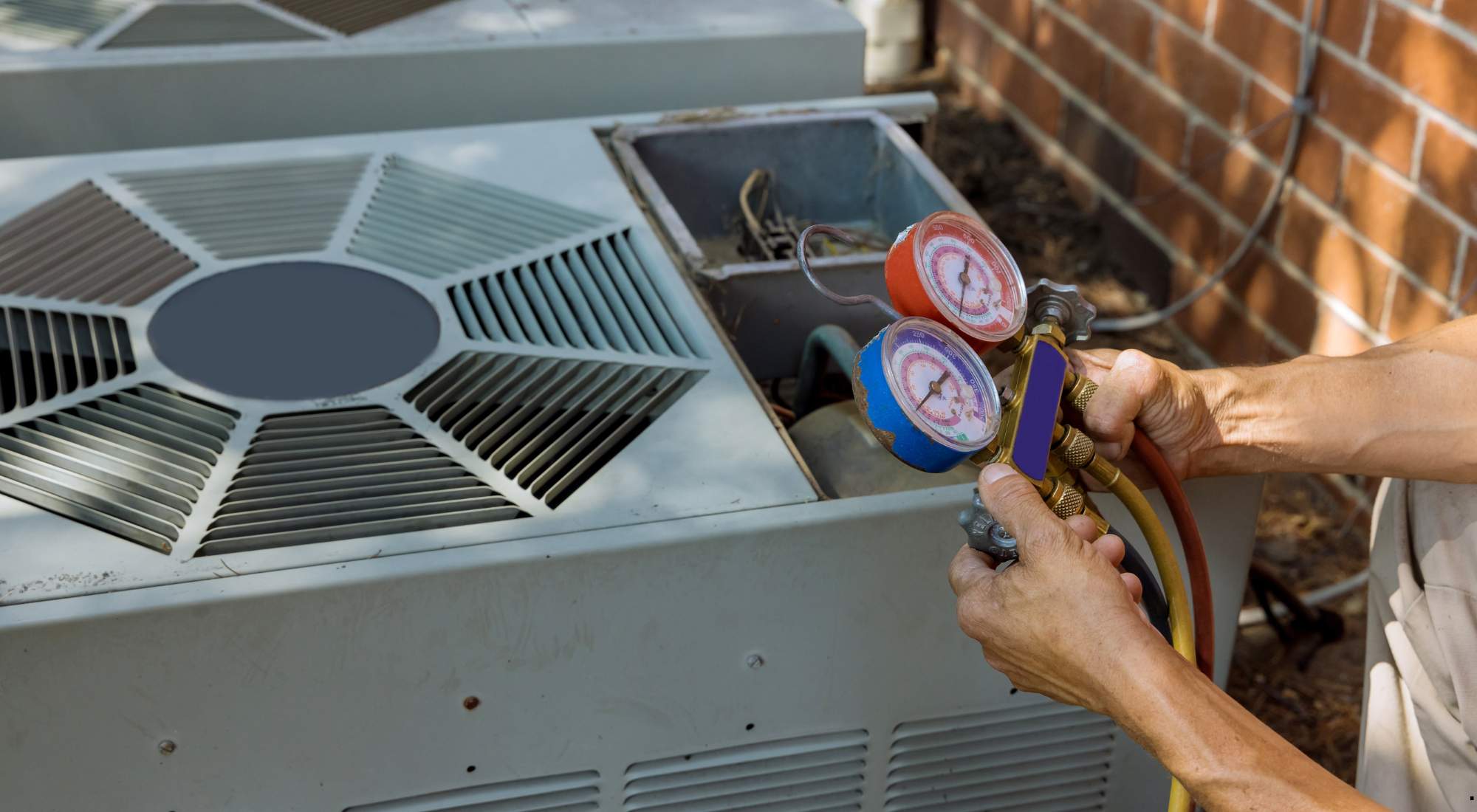
With so much misinformation floating around about HVAC systems, it’s no wonder homeowners are left confused about how to properly care for one of the most expensive appliances in their home.
From internet myths to well-meaning but outdated advice, it can be tough to separate fact from fiction.
That’s why we’ve put together this straightforward guide to clear up the confusion and help you avoid these HVAC mistakes that can shorten the life of your unit.
By the end, you’ll have the knowledge you need to keep your system running efficiently, avoid costly repairs, and get the most out of your investment.
Table of Contents
- The 10 Most Common HVAC Mistakes and How To Avoid Them
- Frequently Asked Questions About HVAC Problems
- AAA Heating and Cooling: Avoid Common HVAC Mistakes When You Use Portland’s HVAC Specialists
The 10 Most Common HVAC Mistakes and How To Avoid Them
#1: Neglecting Maintenance
Without regular check-ups, minor issues like dirty coils, loose wiring, or a failing capacitor can go unnoticed until they cause a full system breakdown.
AAA Heating and Cooling’s professional maintenance visits are designed to identify and address these issues early, ensuring your system runs efficiently. Our experts will inspect every part of your HVAC system, including:
- Heat exchanger
- Safety controls
- Ignition assemblies and condensate drains
- Electrical connections
- Lubrication in moving parts
- Thermostat settings to ensure everything is operating as it should
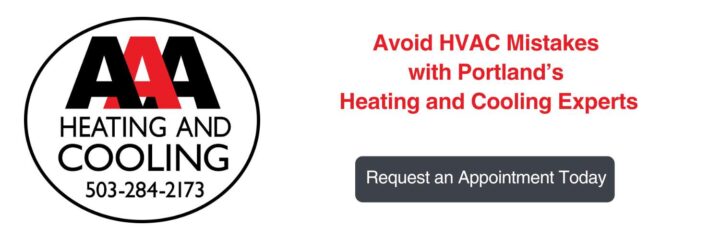
#2: Installing the Wrong Size HVAC Unit
Many homeowners assume that “bigger is better” in terms of HVAC size, but an oversized system may actually run inefficiently, cycling on and off too frequently, which leads to uneven temperatures, higher humidity, and unnecessary wear and tear. This not only creates a home that feels cool but also damp or “clammy,” but also shortens the life of your unit and increases maintenance costs over time.
On the flip side, an undersized unit will struggle to meet demands, running nonstop and still falling short on comfort. It may seem like it’s working harder, and that’s exactly the problem. To avoid costly mistakes, HVAC systems should be sized using load calculations that take into account factors such as square footage, insulation, occupancy, and sunlight exposure.
#3: Ignoring Leaks
One of the biggest and most costly mistakes homeowners make with their HVAC system is ignoring leaks, especially in the ductwork. Leaky air ducts allow conditioned air to escape into walls, attics, or unconditioned spaces, which means your system has to work harder to maintain a comfortable home temperature.
This not only raises your energy bills but also strains your equipment. Worse, leaks can draw in unfiltered air from dusty or humid areas, resulting in poor indoor air quality or even mold growth. Properly sealing ducts and keeping them within conditioned spaces is key to efficiency and healthy airflow.
#4: Closing Vents
Many homeowners believe that shutting vents will reduce utility costs, but it often leads to imbalanced airflow, causing your HVAC system to work harder than necessary. This added strain can increase energy consumption, raise your bills, and even damage system components over time.
When vents are closed or blocked, air pressure builds in the ducts, disrupting circulation and causing issues like high humidity or uneven temperatures. Unless you have a zoned system, it’s best to keep vents and interior doors open so your HVAC can run efficiently and evenly.
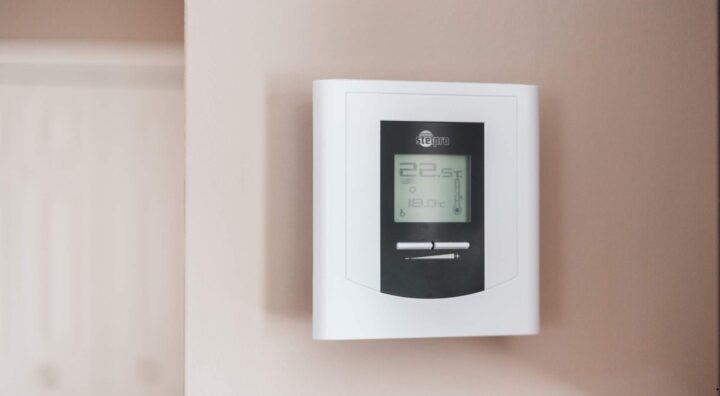
#5: Not Using a Programmable Thermostat
Not using a programmable thermostat is a missed opportunity for both comfort and cost savings. These thermostats allow you to set different temperatures throughout the day based on your schedule—cooler while you sleep, more efficient while you’re away, and comfortable when you’re home.
If your current thermostat is outdated or lacks scheduling features, upgrading is a smart move. Not only does it help reduce energy waste, but it also gives your HVAC system a break when it doesn’t need to run full force — frequent cycling could signal a problem. A programmable thermostat helps prevent overuse by running your system only when necessary, protecting both your HVAC system and your wallet.
#6: Incorrect Thermostat Settings
The thermostat is the brain of your HVAC system, and even small setting errors can cause discomfort and raise energy bills. Setting it too low in summer or too high in winter causes the system to work harder than necessary, resulting in extra wear and wasted energy.
To avoid this, adjust your thermostat settings according to the season—set it to 78°F in the summer when you’re home and around 68°F in the winter. Using programmable or smart thermostats can help optimize these settings automatically, ensuring comfort while reducing energy consumption. A few smart adjustments can go a long way in keeping both your home and your wallet comfortable.
#7: Not Calling the Professionals
DIY fixes might seem like a money-saver, but they often lead to bigger, costlier problems. HVAC systems are complex and need proper tools, training, and experience. A small mistake—like miswiring a thermostat or overcharging refrigerant—can cause damage, reduce efficiency, or void your warranty.
Whether you’re looking for a quick tune-up, preventive maintenance, or a major repair, call the professionals.
AAA Heating and Cooling’s licensed HVAC technicians are trained to identify problems you might miss and ensure every component works safely and efficiently. Trusting the experts not only protects your system but also gives you peace of mind knowing the job is done right the first time.

#8: Delaying Repairs
At AAA Heating & Cooling, your trusted Portland HVAC company, we’ve seen how quickly a strange noise or a slight drop in airflow can turn into a full-blown system failure. That’s why we encourage homeowners to call us at the first sign of trouble. The sooner you reach out, the easier—and often more affordable—the fix will be.
Our team is trained to diagnose issues quickly and get your system back on track, helping you avoid discomfort and extra costs. Whether you’ve tried a DIY fix, have an ongoing issue, or noticed a recent change, don’t wait—call the experts at AAA Heating & Cooling today.
#9: Forgetting To Change Air Filters
Air filters are designed to trap dust, pet hair, pollen, and other airborne particles, helping to keep your home’s air clean and your system running smoothly. But when those filters become clogged, which they inevitably will if not changed regularly, they restrict airflow and force the system, especially the fan motor, to work much harder than it should.
This added strain can raise energy bills and cause costly damage, like a burned-out motor. To prevent this, clean filters weekly or biweekly and replace them every one to three months, depending on use. This simple habit protects your system, improves air quality, and keeps your home comfortable.
#10: Disregarding the Outdoor Condenser Unit
Many homeowners overlook the fact that the outdoor unit is crucial for releasing indoor heat and requires open space and airflow to work properly. If it’s placed in a cramped, sunny spot or gets covered with debris, it can’t release heat efficiently, causing overheating, extra wear, and higher energy bills.
To keep your system running smoothly, it’s important to maintain the area around the condenser unit. Trim back any nearby vegetation, avoid placing items too close to it, and gently rinse the unit with a garden hose a few times a year, always turning off the power first.
Cleaning the condenser coils and scheduling professional maintenance annually can also help improve airflow, boost performance, and extend the life of your HVAC system. Just like people need space to breathe and function, your outdoor unit needs room to operate efficiently.
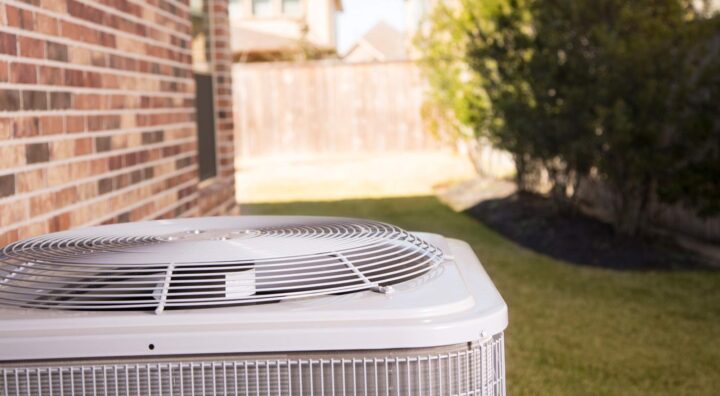
Frequently Asked Questions About HVAC Problems
How Do You Know if Something Is Wrong With Your HVAC?
You can tell something’s wrong with your HVAC system if you notice unusual noises, inconsistent temperatures, rising energy bills, or poor air quality. These signs often indicate mechanical issues, airflow problems, or inefficiencies that require attention.
Other red flags include strange odors, water leaks, excessive humidity, or the system cycling too frequently. Even subtle changes, like one room always feeling hotter or colder, can indicate a bigger issue. The sooner you address these symptoms with a qualified technician, the more likely you are to avoid major repairs and keep your system running efficiently.
What Are the Most Common Problems With HVAC Systems?
Some of the most common HVAC problems are surprisingly easy to overlook—issues such as dirty air filters, low refrigerant levels, or a thermostat that’s not accurately reading the temperature. These issues may seem minor, but they can lead to uneven heating or cooling, increased energy bills, and a system that struggles to maintain optimal performance.
Other frequent culprits include worn-out blower motors, dirty coils, and problems with the heating unit, like a faulty pilot light. Often, these problems build up slowly due to a lack of routine/preventative maintenance. The good news? A little attention goes a long way. Catching these issues early can save you from bigger headaches—and bigger repair bills—down the line.
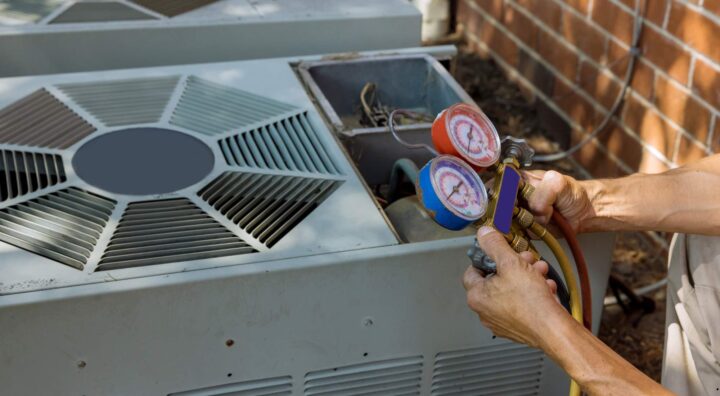
What Is the Most Common Part To Fail on HVAC?
The most common part to fail in an HVAC system is the capacitor, and while it’s small, it plays a big role. Capacitors help start and run the motors that keep your system’s fans and compressor working. When they wear out, which often happens with age, heat, or power surges, your HVAC might have trouble starting up or stop running altogether.
If your system is making a humming noise, struggling to start, or randomly shutting down, a faulty capacitor could be the cause. It’s a common issue, especially in older units, but the good news is it’s usually a quick and affordable fix when caught early.
AAA Heating and Cooling: Avoid Common HVAC Mistakes When You Use Portland’s HVAC Specialists
When it comes to your home’s comfort and energy efficiency, avoiding these common HVAC mistakes can make all the difference. From routine maintenance and proper thermostat use to timely repairs and system sizing, every detail matters.
At AAA Heating & Cooling, we’ve been helping families across the Portland Metro Area for over 62 years. As a local, family-owned business based in Portland and Beaverton, we take pride in treating our customers like neighbors, because they are.
When you choose AAA, you’re not just getting expert service, you’re joining a community built on trust and care. Whether you need a seasonal tune-up, emergency repair, or just honest advice, we’re here for you today and for the long run.
